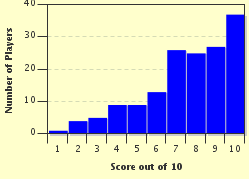Quiz Answer Key and Fun Facts
1. What explorer, born in Italy but commissioned by Henry VII of England, DIDN'T find the Northwest Passage to Asia he sought, but DID make landfall near the Grand Banks of Newfoundland in 1497, unknowingly making the first "discovery" of North America by Europeans since the Vikings?
2. It is now believed that he DIDN'T seek to steal Christopher Columbus's glory or lie about his voyages, but he DID figure out that the lands being explored by the Spanish and Portuguese were part of a newly discovered continent, not Asia. Who was this critical thinker whose name was given to new lands in 1507?
3. What Spanish explorer DIDN'T succeed in establishing a permanent European settlement near Tampa Bay, Florida, in 1528, but DID survive with four out of the original 300 colonists for eight years, wandering all the way to the Pacific Ocean and deep into Mexico before returning to Spain and writing about his experiences?
4. What Portuguese explorer DIDN'T complete the first circumnavigation of the earth with his crew but DID cross both the Atlantic and Pacific Oceans and was the first to navigate around the tip of South America, through the strait named for him?
5. What explorer DIDN'T find the "Golden Land" of El Dorado on his expeditions near the mouth of the Orinoco river in Guiana (in present day Venezuela), but DID sponsor the first English colony in Virginia (at Roanoke in present day North Carolina) and DID stimulate the desire in England for new world products like tobacco, potatoes, and medicinal plants.
6. What explorer for the Dutch East India Company DIDN'T catch sight of mainland Australia, but DID sail all the way around it, explored the coast of Tasmania, visited Tonga and the Fiji Islands, and became the first European navigator to describe the "groot hooch verheven landt" (large land, uplifted high) that would later be named New Zealand?
7. He claimed that he DIDN'T know the assistant of his chief botanist was a woman, Jeanne Baret, but this 18th century French explorer's name DID become well-known because one of the plants Baret helped collect in South America was named for him. Whose name was given to the ornamental plant with bright flowers now found in tropical climates around the world?
8. What man, born in Scotland, DIDN'T reach the Pacific Ocean following the river later named for him, but later DID complete the first successful crossing of the North American continent (with the exception of Mexico) in 1793?
9. What explorer of Africa DIDN'T receive respect from his flashy fellow explorer Richard Burton and much of the British public, but DID discover Lake Victoria and the source of the White Nile in 1858?
10. What Scotsman DIDN'T cross Australia first, but DID make six journeys exploring the interior of the continent and was recognized as the first expedition leader to traverse Australia from south to north and come back alive?
Source: Author
nannywoo
This quiz was reviewed by FunTrivia editor
bloomsby before going online.
Any errors found in FunTrivia content are routinely corrected through our feedback system.

